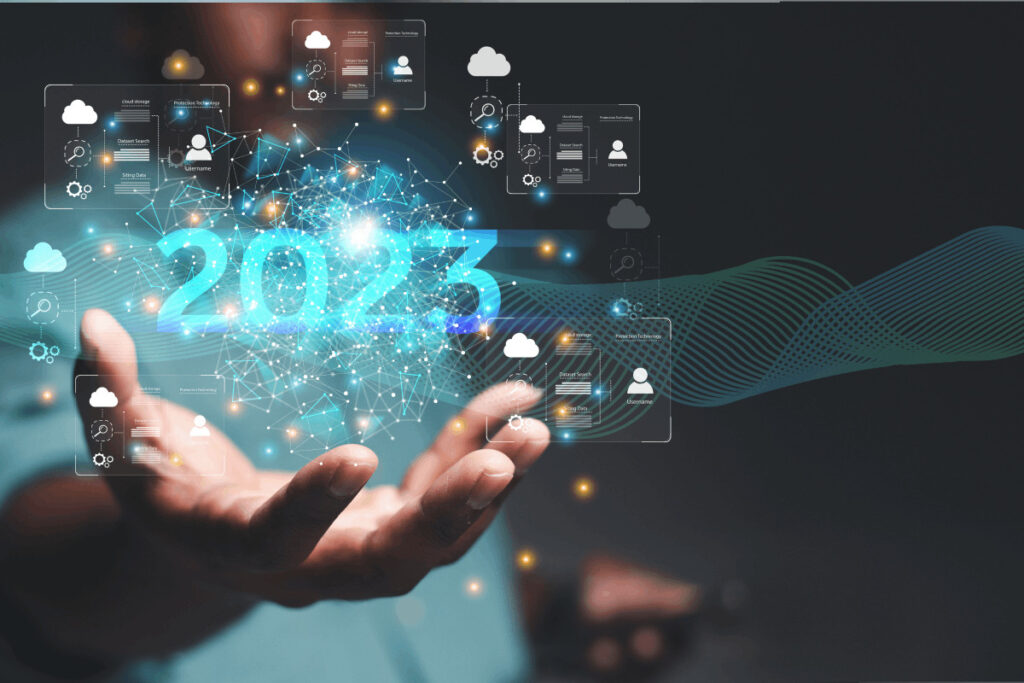Table of Contents
Introducing 9 New Technological Trends
Technology is rapidly evolving, and every year, we witness new advancements that are beyond our imagination. The year 2023 is no different, and we can expect to see significant changes in the way we live, work, and interact with technology. In this article, we will discuss some of the new technological trends that we can expect to see in 2023.

1. 5G Networks
5G networks are the fifth-generation cellular network technology that is expected to be widely available in 2023. This technology offers faster data speeds, lower latency, and increased network capacity. With 5G networks, we can expect to see a significant improvement in internet connectivity and better user experiences for internet-enabled devices. This technology is expected to have a significant impact on industries like healthcare, transportation, and entertainment and is one of the biggest new technological trends.
2. Artificial Intelligence (AI)
AI has been around for a while, but it’s still in its early stages. In 2023, we can expect to see significant advancements in AI, particularly in the areas of natural language processing, speech recognition, and computer vision. AI-powered virtual assistants, chatbots, and voice-enabled devices will become more accurate and responsive, making it easier for people to interact with technology.
3. Extended Reality (XR)
Extended reality is an umbrella term that covers virtual reality (VR), augmented reality (AR), and mixed reality (MR). In 2023, we can expect to see a significant increase in the use of XR technologies in various industries like healthcare, education, and entertainment. XR technologies offer immersive experiences that can help in training, education, and therapy.
4. Quantum Computing
Quantum computing is a new technology that promises to revolutionize the computing industry. It uses quantum mechanics to perform complex computations that are beyond the capabilities of classical computers. In 2023, we can expect to see significant advancements in quantum computing, particularly in the areas of cryptography, drug discovery, and machine learning.
5. Blockchain Technology
Blockchain technology has been around for a while, but it’s still in its early stages. In 2023, we can expect to see more widespread adoption of blockchain technology in various industries like finance, healthcare, and logistics. Blockchain technology offers a secure and decentralized way of storing and sharing data, making it ideal for applications that require transparency and security.
6. Internet of Things (IoT)
The Internet of Things (IoT) refers to the network of physical devices, vehicles, home appliances, and other items that are embedded with electronics, software, sensors, and network connectivity. In 2023, we can expect to see a significant increase in the number of IoT devices and the use of IoT in various industries like healthcare, transportation, and manufacturing.
7. Edge Computing
Edge computing is a new technology that enables data processing and analysis to be performed closer to the source of data. This technology is particularly useful for applications that require low latency and real-time data processing. In 2023, we can expect to see more widespread adoption of edge computing, particularly in the areas of IoT, autonomous vehicles, and smart cities.
8. Cloud Computing
Cloud computing has been around for a while, but it’s still evolving. In 2023, we can expect to see significant advancements in cloud computing, particularly in the areas of hybrid cloud, multi-cloud, and edge cloud computing. Cloud computing offers scalability, flexibility, and cost-effectiveness, making it ideal for applications that require high computing power.
9. Cybersecurity
Cybersecurity is becoming increasingly important, given the rise in cyber threats and attacks. In 2023, we can expect to see more advanced cybersecurity solutions, particularly in the areas of artificial intelligence, machine learning, and blockchain technology. Cybersecurity will continue to be a significant concern in 2023 and beyond, as cybercriminals become more sophisticated and continue to find new ways to exploit vulnerabilities in our systems. To combat this, companies and organizations will need to invest in more advanced cybersecurity solutions that incorporate artificial intelligence and machine learning to detect and prevent threats in real-time.
Blockchain technology, with its secure and decentralized nature, is also expected to play a significant role in improving cybersecurity. By using blockchain technology, we can create a tamper-proof record of all transactions and prevent unauthorized access to sensitive data.
Final Thoughts on New Technological Trends
In conclusion, as we move towards a more digitally connected world, cybersecurity will become increasingly important. It’s essential to stay informed and take the necessary steps to protect our digital assets and infrastructure. With advanced cybersecurity solutions and technologies like blockchain, we can ensure a safer and more secure digital future by recognizing these new technological trends.

